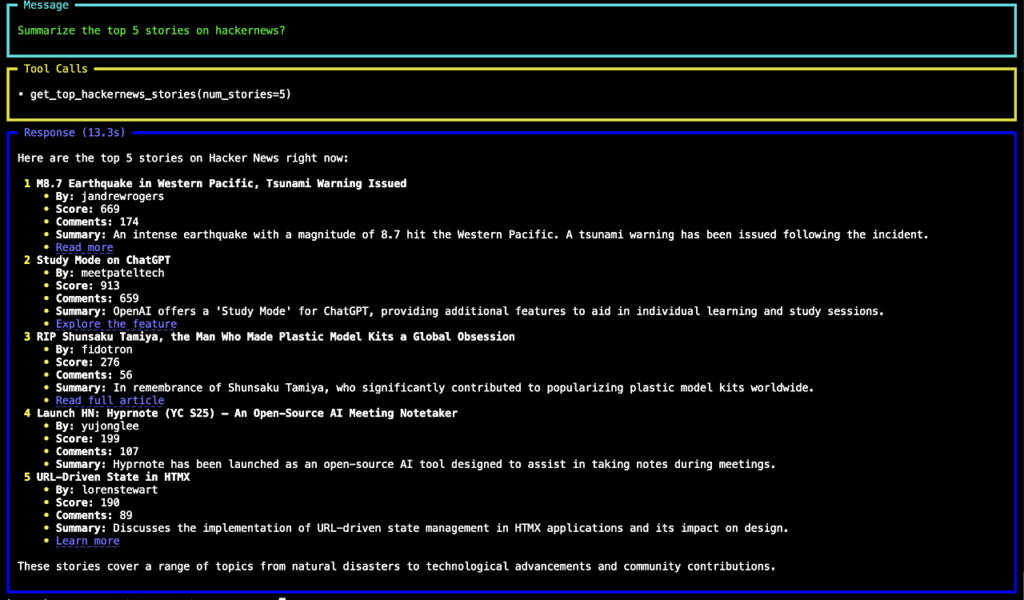ツールは Agno エージェントが外部の世界とやり取りするのを支援する関数です。ツールは、web 検索、SQL の実行、電子メールの送信や API 呼び出しのような外部システムとのやり取りを可能にすることで、エージェントを「エージェント型 (agentic)」にします。
Agno : ユーザガイド : コンセプト : ツール – 概要 / 独自ツールの作成
作成 : クラスキャット・セールスインフォメーション
作成日時 : 07/29/2025
バージョン : Agno 1.7.5
* 本記事は docs.agno.com の以下のページを独自に翻訳した上で、補足説明を加えてまとめ直しています :
- User Guide : Concepts : Tools – What are Tools?
- User Guide : Concepts : Tools – Writing your own tools
* サンプルコードの動作確認はしておりますが、必要な場合には適宜、追加改変しています。
* ご自由にリンクを張って頂いてかまいませんが、sales-info@classcat.com までご一報いただけると嬉しいです。
◆ お問合せ : 下記までお願いします。
- クラスキャット セールス・インフォメーション
- sales-info@classcat.com
- ClassCatJP

Agno ユーザガイド : コンセプト : ツール – 概要
ツールは Agno エージェントが外部の世界とやり取りするのを支援する関数です。
ツールは、web 検索、SQL の実行、電子メールの送信や API 呼び出しのような外部システムとのやり取りを可能にすることで、エージェントを「エージェント型 (agentic)」にします。
Agno は 80+ の事前構築済みツールキットを備えますが、殆どの場合、独自ツールを作成することになります。一般的な構文は :
import random
from agno.agent import Agent
from agno.models.openai import OpenAIChat
from agno.tools import tool
@tool(show_result=True, stop_after_tool_call=True)
def get_weather(city: str) -> str:
"""Get the weather for a city."""
# In a real implementation, this would call a weather API
weather_conditions = ["sunny", "cloudy", "rainy", "snowy", "windy"]
random_weather = random.choice(weather_conditions)
return f"The weather in {city} is {random_weather}."
agent = Agent(
model=OpenAIChat(model="gpt-4o-mini"),
tools=[get_weather],
markdown=True,
)
agent.print_response("What is the weather in San Francisco?", stream=True)
Note : 上記の例では、get_weather 関数がツールです。それが呼び出されたとき、show_result=True を設定しているため、ツールの結果は出力で表示されます。
それから、stop_after_tool_call=True を設定しているので、エージェントはツール呼び出しの後に停止します。
ツールキット・クラスの使用
ツールキット・クラスは、複数のツールを (それらの実行に対して追加の制御により) 管理する方法を提供します。実行後にエージェントを停止するツール、結果を表示するツールを指定できます。
from agno.agent import Agent
from agno.models.openai import OpenAIChat
from agno.tools.googlesearch import GoogleSearchTools
agent = Agent(
model=OpenAIChat(id="gpt-4.5-preview"),
tools=[
GoogleSearchTools(
stop_after_tool_call_tools=["google_search"],
show_result_tools=["google_search"],
)
],
show_tool_calls=True,
)
agent.print_response("What's the latest about gpt 4.5?", markdown=True)
この例では、GoogleSearchTools ツールキットは google_search 関数を実行後にエージェントを停止し、この関数の結果を表示するように設定されています。
Agno ユーザガイド : コンセプト : ツール – 独自ツールの作成
独自ツールの作成方法と、@tool デコレータを使用してツールの動作を変更する方法を学習します。
殆どの本番環境の場合、独自のツールを作成する必要があります。それが、Agno で最高のツール使用エクスペリエンスを提供することにフォーカスしている理由です。
ルールは単純です :
- 任意の python 関数は、エージェントによりツールとして使用できます。
- @tool デコレータを使用してこのツールが呼び出される前後に起きることを変更できます。
任意の python 関数がツールとして使用可能
例えば、get_top_hackernews_stories 関数をツールとして使用する方法を以下に示します :
hn_agent.py
import json
import httpx
from agno.agent import Agent
def get_top_hackernews_stories(num_stories: int = 10) -> str:
"""
Use this function to get top stories from Hacker News.
Args:
num_stories (int): Number of stories to return. Defaults to 10.
Returns:
str: JSON string of top stories.
"""
# Fetch top story IDs
response = httpx.get('https://hacker-news.firebaseio.com/v0/topstories.json')
story_ids = response.json()
# Fetch story details
stories = []
for story_id in story_ids[:num_stories]:
story_response = httpx.get(f'https://hacker-news.firebaseio.com/v0/item/{story_id}.json')
story = story_response.json()
if "text" in story:
story.pop("text", None)
stories.append(story)
return json.dumps(stories)
agent = Agent(tools=[get_top_hackernews_stories], show_tool_calls=True, markdown=True)
agent.print_response("Summarize the top 5 stories on hackernews?", stream=True)
出力

@tool デコレータのマジック
ツールの動作を変更するには、@tool デコレータを使用します。幾つかの注目すべき機能は :
- requires_confirmation=True : 実行前にユーザの確認を必要とします。
- requires_user_input=True : 実行前にユーザの入力を必要とします。user_input_fields を使用して、どのフィールドがユーザ入力を必要としているか指定します。
- external_execution=True : ツールはエージェントの制御の外で実行されます。
- show_result=True : ツール呼び出しの出力をエージェントの応答で表示します。このフラグなしでは、ツール呼び出しの結果は更なる処理のためにモデルに送信されます。
- stop_after_tool_call=True : ツール呼び出しの後、エージェントの実行を停止します。
- tool_hooks : このツール呼び出しの前後にカスタムロジックを実行します。
- cache_results=True : 同じ呼び出しの繰り返しを避けるために、ツールの結果をキャッシュします。cache_dir と cache_ttl を使用してキャッシュを設定します。
@tool デコレータで可能な多くのパラメータを使用する例が以下です。
advanced_tool.py
import httpx
from agno.agent import Agent
from agno.tools import tool
from typing import Any, Callable, Dict
def logger_hook(function_name: str, function_call: Callable, arguments: Dict[str, Any]):
"""Hook function that wraps the tool execution"""
print(f"About to call {function_name} with arguments: {arguments}")
result = function_call(**arguments)
print(f"Function call completed with result: {result}")
return result
@tool(
name="fetch_hackernews_stories", # Custom name for the tool (otherwise the function name is used)
description="Get top stories from Hacker News", # Custom description (otherwise the function docstring is used)
show_result=True, # Show result after function call
stop_after_tool_call=True, # Return the result immediately after the tool call and stop the agent
tool_hooks=[logger_hook], # Hook to run before and after execution
requires_confirmation=True, # Requires user confirmation before execution
cache_results=True, # Enable caching of results
cache_dir="/tmp/agno_cache", # Custom cache directory
cache_ttl=3600 # Cache TTL in seconds (1 hour)
)
def get_top_hackernews_stories(num_stories: int = 5) -> str:
"""
Fetch the top stories from Hacker News.
Args:
num_stories: Number of stories to fetch (default: 5)
Returns:
str: The top stories in text format
"""
# Fetch top story IDs
response = httpx.get("https://hacker-news.firebaseio.com/v0/topstories.json")
story_ids = response.json()
# Get story details
stories = []
for story_id in story_ids[:num_stories]:
story_response = httpx.get(f"https://hacker-news.firebaseio.com/v0/item/{story_id}.json")
story = story_response.json()
stories.append(f"{story.get('title')} - {story.get('url', 'No URL')}")
return "\n".join(stories)
agent = Agent(tools=[get_top_hackernews_stories])
agent.print_response("Show me the top news from Hacker News")
以上
